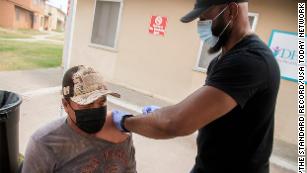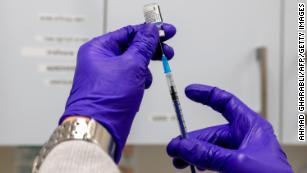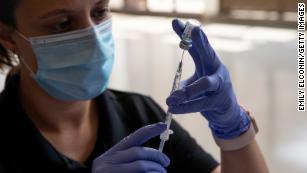begin quote from:
https://www.cnn.com/2021/09/14/health/booster-vaccines-fda-advisers-walkup/index.html
Expect a bumpy ride this week when FDA advisers consider Covid-19 booster shots

By Elizabeth Cohen, CNN Senior Medical Correspondent
Updated 8:53 PM ET, Tue September 14, 2021
(CNN)Last December, when advisers to the US Food and Drug Administration met to consider whether the agency should authorize Pfizer's Covid-19 vaccine, it was generally understood that the answer would be yes.
Nine months later, those advisers are meeting to discuss booster shots, and the situation is very different.
It won't be a slam dunk.
When this advisory committee meets on Friday, it will be presented with dueling data, some of it suggesting there's a need for boosters, but other pieces of data suggesting there is no such need.
The advisers will also likely debate the very essence of Covid-19 boosters -- whether they would work and what they're even supposed to accomplish in the first place.
"This will be much messier than in December," said Dr. William Schaffner, an infectious disease specialist at Vanderbilt University. Schaffner has been following the FDA deliberations closely, as he serves as member of an advisory committee to the US Centers for Disease Control and Prevention that will review booster shots if the FDA green lights Pfizer's application.
To complicate matters, the booster controversy has become political and even somewhat bitter.
Last month, President Joe Biden announced his administration's intention to start a booster program, even citing a specific timeline: the week of September 20. That earned the ire of scientists who say the President should have kept quiet on the issue before the FDA and the CDC did their reviews.
Enter your email to subscribe to the Results Are In Newsletter with Dr. Sanjay Gupta.
close dialog
Two FDA vaccine experts announced plans to leave the agency amid speculation that the President's announcement was a reason.
Monday, those FDA staffers -- two of the agency's top vaccine experts -- co-authored an article stating that the data does not appear to support a need for booster shots for the general public right now. It was an unexpected move, given that FDA staff usually keep quiet publicly about drug and vaccine applications.
Schaffner, an infectious disease expert at Vanderbilt University, searched for the right word to explain the entire set of circumstances around Friday's meeting.
"It's -- well, unconventional," he said.
Are boosters even needed?
An august panel of experts, formally called the FDA's Vaccines and Related Biological Products Advisory Committee, will be meeting Friday. Most of them are academic medical researchers, and they advise the FDA on whether to approve new drugs and vaccines. Typically, the agency takes their advice.
One of their first questions will likely be: Do we even need boosters in the first place? Maybe two shots of Pfizer's vaccine are enough?
Three separate articles published last week in the CDC's Morbidity and Mortality Weekly Report suggest that we don't need boosters.
All three studies essentially concluded that well into the summer, the two doses did a good job of keeping people from ending up in the hospital with Covid-19. One study looked at data from 13 states and counties, another looked at data from nine states, and the third looked at data from five Veterans Affairs medical centers.
In that same vein, a study in Qatar found that protection against hospitalization and death persists for at least six months after the second dose.
On the other hand, an Israeli study found that over time, the vaccines' power to keep people from getting very sick with Covid-19 diminished. Looking at illnesses in the second half of July, that study found that those who'd received their second dose of Pfizer's vaccine in March were 70% more protected against severe disease than those who received the second shot in January.
On Friday, expect lots of wonky debate about the strengths and weaknesses of each of those studies.
"There are several sources of data we're using to make this decision, and they are just different from each other," said Dr. Eric Rubin, a member of the advisory committee and an infectious disease expert at Harvard. "Some are better than others and each asked different questions, so there are lots of apples to oranges comparisons going into this."
What is Pfizer expected to say?
At Friday's meeting, Pfizer is expected to present three types of data.
The first will show that antibodies against Covid-19 declined with time after people received their second dose, and that a third dose about six months later increased the antibodies.
That won't necessarily impress the advisers. Dr. Paul Offit, one of the committee members, argues that antibodies often go down in the months following vaccination, and that other parts of the immune system with better "memory" then kick in to protect against the virus.
The second set of data will be the Israeli study suggesting that over time, two shots of the vaccine stopped being as effective at keeping people out of the hospital.
The third set of data will look at whether giving a third shot helps keep people out of the hospital.
Two countries -- Hungary and Israel -- have had a major booster program underway. Israel has data showing that people over age 60 who received a booster were more than 10 times less likely to become severely ill with Covid-19.
Israel felt so strongly about a booster program that they didn't even wait for the FDA and the CDC to weigh in on whether it's a good idea.
"I think there was a different level of urgency felt in the two countries," said Dr. Ran Balicer, chairman of Israel's Covid-19 National Expert Advisory Panel. "We could have followed [the FDA] but in the situation that we were at, it was obvious that action was needed urgently. Decisions needed to be made."
Two Israeli scientists are expected to present data to the advisory meeting Friday.
Friction with the Biden administration
All of this scientific back and forth will happen against the backdrop of friction between committee members and the Biden administration.
Advisers to the FDA told CNN they don't like that that Biden announced a booster program even though the FDA and the CDC have not weighed in on a potential booster program.
Get CNN Health's weekly newsletter
Sign up here to get The Results Are In with Dr. Sanjay Gupta every Tuesday from the CNN Health team.
"They completely subverted the process. They marginalized the FDA and marginalized the CDC," Offit said. "You just can't do this the way that they did it."
Schaffner added that the Biden administration's action came as a surprise to doctors and scientists.
He compared it to when President Donald Trump last year pronounced certain approaches, such as the drug hydroxychloroquine, as treatments for Covid-19 even though no studies had been done.
What Trump did "profoundly upset people," Schaffner said, and "it was not anticipated that anything like that would happen in the current administration."
Rubin, the Harvard infectious disease expert and FDA vaccine adviser, said it won't matter to him and his colleagues what Biden said.
"I think it's really important to point out that none of us works directly for the President, and what the President says doesn't really affect our vote" on the committee, Rubin said. "I feel that very strongly."




















No comments:
Post a Comment